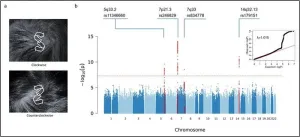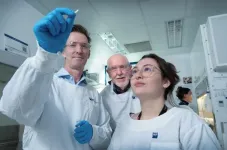Huge tipping events dominated the evolution of the climate system
For the last 66 million years, the climate system was dominated by two significant climate events, dividing the period into two distinct climate eras
2023-08-09
(Press-News.org) An analysis of the hierarchy of tipping points suggests that during the last 66 million years two events set the scene for further climate tipping and for the evolution of the climate system in particular. If the anthropogenic climate change of today leads to complete deglaciation, the evolution of Earth's climate will be influenced on a geological time scale, the authors suggest. The work by Denis-Didier Rousseau, Université Montpellier, France, Witold Bagniewski, Ecole Normale Supérieure, Paris, France, and Valerio Lucarini, University of Reading, UK is published in Scientific Reports and is part of the European TiPES project on tipping points in the Earth System.
Inspired by a theory of evolution
The new insight into the history of climate change was inspired by the theory of punctuated equilibrium which ranks evolutionary changes into hierarchies.
The idea was introduced in the 70'ies by Eldredge and Gould as an alternative to classic evolution theory. Punctuated equilibrium proposes that some evolutionary changes determine the evolution of a species more than others. And it explains why species have a tendency to adapt in short evolutionary spurts, rather than gradually over time.
Rousseau et al. speculated that a similar approach of ranking the importance of historical climate changes through tipping events might prove equally beneficial. For that, they applied advanced statistical methods to two series of climate data with clear signs of critical transitions.
The results indeed suggest that the idea of hierarchies in the evolution of the climate system can lead to new insights. The analysis reveals that two major events out of the ten dominated the evolution of the Earth's climate system over the last 66 million years.
A hierarchy of climate tipping events
The first event was the Chicxulub meteor impact in Mexico which killed off the large dinosaurs approximately 65,5 million years ago. This catastrophe marked the beginning of a very warm period with high levels of CO2. For the following 30 million years this regime dictated which climatic changes were possible and kept it within the regime of hot and warm climates.
The second crucial event was the tipping point associated with the glaciation of the Southern hemisphere 34 million years ago when the Antarctic continent was isolated at the South Pole due to plate tectonics. The forming of the large ice sheet led to the glaciation of the North as well and marked the beginning of a considerably colder type of climate on Earth, again dictating the scope of future climate changes.
The analysis additionally suggests that our current global climate system still belongs to the latter climate regime and still depends on the existence of the gigantic ice bodies built within the Coolhouse/Icehouse era.
Serious repercussions
In the event that the ice sheets should not withstand anthropogenic global warming, the deglaciation will therefore represent a landmark tipping point similar to the two that have dominated Earth's history leading to a new unknown climate landscape.
”The ice sheets are key components in the present climate system. But they are very sensitive. They presently experience a negative mass balance, and there are numerous reports of evidence of melting under the impact of the current climate warming, translating a trend towards a potential tipping point that could accelerate the disappearance at least of Greenland and West Antarctica, with serious repercussions for our societies” says Denis-Didier Rousseau.
“Crossing tipping points has been a recurrent feature in climate evolution. Our study reveals a better understanding now of the mathematics of such events. As a consequence, strategies of adaptation to and mitigation of climate change should now take into account the possible destabilization of tipping elements,” adds Valerio Lucarini.
The TiPES project is an EU Horizon 2020 interdisciplinary climate science project on tipping points in the Earth system. 18 partner institutions work together in more than 10 countries. TiPES is coordinated and led by The Niels Bohr Institute at the University of Copenhagen, Denmark, and the Potsdam Institute for Climate Impact Research, Germany. The TiPES project has received funding from the European Horizon 2020 research and innovation program, grant agreement number 820970. END
ELSE PRESS RELEASES FROM THIS DATE:
Electrical signals between skin cells may influence melanoma initiation
2023-08-09
PHILADELPHIA – The transfer of a neurotransmitter from one type of skin cell to another (melanocytes to keratinocytes) altered electrical activity and promoted melanoma initiation in preclinical models, according to results published in Cancer Discovery, a journal of the American Association for Cancer Research.
Melanoma is a deadly form of skin cancer that develops in melanin-containing skin cells known as melanocytes. An intrinsic feature of melanocytes is their ability to secrete melanin-containing vesicles to surrounding skin ...
The voices of indigenous peoples and local communities as an important part of the climate fight
2023-08-09
Coinciding with the International Day of Indigenous Peoples, an ICTA-UAB study calls for indigenous peoples' in-depth knowledge of climate change to be considered.
Indigenous Peoples and local communities around the world have a rich and extensive general knowledge of climate change impacts and possible ways to adapt. This knowledge should be recognised by both science and climate policy.
This is the main conclusion of an international study led by the Institute of Environmental Science and Technology of the Universitat Autònoma de Barcelona (ICTA-UAB) which has spent five years analysing and providing detailed data on how Indigenous Peoples and local communities ...
Having a bad hair day? Blame your genes!
2023-08-09
Philadelphia, August 9, 2023 – The first gene mapping study on human scalp hair whorls not only shows that hair whorl direction has a genetic basis, but also that it is affected by multiple genes. Four associated genetic variants that are likely to influence hair whorl direction are identified, as reported in the Journal of Investigative Dermatology, published by Elsevier.
A hair whorl is a patch of hair growing in a circular pattern around a point specified by hair follicle orientations. As an easily observed human trait, scalp hair whorl pattern is typically defined by the whorl number (single ...
New survey confirms need for more menopause education in residency programs
2023-08-09
CLEVELAND, Ohio (August 9, 2023)—Despite the fact that nearly 90 million women in the United States are projected to be postmenopausal by 2060, menopause remains low on the priority list of many residency programs. A new survey reveals the lack of a standardized menopause curriculum and limited access to menopause educational resources for residents. Results of the survey are published online today in Menopause, the journal of The Menopause Society.
Because women today are living longer, it is not surprising that there are a record number of postmenopausal women. And, that number is only expected ...
Booster shot being developed to avoid recapturing koalas to fight Chlamydia disease
2023-08-09
A booster vaccine using implant technology for koalas is being developed by QUT researchers in the fight against the deadly Chlamydia disease.
The new technology is designed to avoid problems for wild koalas and wildlife handlers having to recapture or hold the animals for 30 days, to receive a second immunisation.
Koala chlamydia is a bacterial infection and is one of the leading causes of death for Australian koalas.
QUT researchers have been successfully testing a two-shot vaccine on an isolated wild koala colony ...
After 15 years, pulsar timing yields evidence of cosmic background gravitational waves
2023-08-09
The universe is humming with gravitational radiation — a very low-frequency rumble that rhythmically stretches and compresses spacetime and the matter embedded in it.
That is the conclusion of several groups of researchers from around the world who simultaneously published a slew of journal articles in June describing more than 15 years of observations of millisecond pulsars within our corner of the Milky Way galaxy. At least one group — the North American Nanohertz Observatory for Gravitational Waves (NANOGrav) collaboration — has found compelling ...
Grant provides cancer research training experience to expand workforce for cancer prevention and control
2023-08-09
University of Arizona Cancer Center researchers were awarded a $1.5 million grant from the National Cancer Institute to deliver an intensive, multidisciplinary cancer prevention and control research training program for undergraduate and graduate students.
According to multiple principal investigators Jennifer Bea, PhD, and Cynthia Thomson, PhD, RD, the goal of the 10-week, full-time summer program is to motivate students to pursue a career in cancer prevention science.
“I am very concerned about the number of skilled scientists and clinicians retiring,” said Dr. Bea, co-leader of the UArizona Cancer ...
World’s largest study shows the more you walk, the lower your risk of death, even if you walk fewer than 5,000 steps
2023-08-09
The number of steps you should walk every day to start seeing benefits to your health is lower than previously thought, according to the largest analysis to investigate this.
The study, published in the European Journal of Preventive Cardiology [1] today (Wednesday), found that walking at least 3967 steps a day started to reduce the risk of dying from any cause, and 2337 steps a day reduced the risk of dying from diseases of the heart and blood vessels (cardiovascular disease).
However, the new analysis of 226,889 people from 17 different studies around the world has shown that the more you walk, the greater the health benefits. ...
Theory meets practice
2023-08-09
(Santa Barbara, Calif.) — Scientific findings don’t always translate neatly into actions, especially in conservation and resource management. The disconnect can leave academics and practitioners disheartened and a bit frustrated.
“We want conservation science to be informing real-world needs,” said Darcy Bradley, a senior ocean scientist at The Nature Conservancy and a former director of UC Santa Barbara’s Environmental Markets Lab.
“Most managers and practitioners also want to incorporate science into their work,” ...
$4M NIH grant will test worksite sleep health coaching for Arizona firefighters
2023-08-09
A $4 million award from the National Heart, Lung, and Blood Institute, a division of the National Institutes of Health, will allow researchers in the University of Arizona Mel and Enid Zuckerman College of Public Health to identify key factors for the successful implementation of workplace sleep coaching to improve sleep health in Arizona firefighters.
Almost half of career firefighters report short sleep and poor sleep quality, and about 37% of firefighters screen positive for sleep disorders like sleep apnea, insomnia or ...
LAST 30 PRESS RELEASES:
Power in motion: transforming energy harvesting with gyroscopes
Ketamine high NOT related to treatment success for people with alcohol problems, study finds
1 in 6 Medicare beneficiaries depend on telehealth for key medical care
Maps can encourage home radon testing in the right settings
Exploring the link between hearing loss and cognitive decline
Machine learning tool can predict serious transplant complications months earlier
Prevalence of over-the-counter and prescription medication use in the US
US child mental health care need, unmet needs, and difficulty accessing services
Incidental rotator cuff abnormalities on magnetic resonance imaging
Sensing local fibers in pancreatic tumors, cancer cells ‘choose’ to either grow or tolerate treatment
Barriers to mental health care leave many children behind, new data cautions
Cancer and inflammation: immunologic interplay, translational advances, and clinical strategies
Bioactive polyphenolic compounds and in vitro anti-degenerative property-based pharmacological propensities of some promising germplasms of Amaranthus hypochondriacus L.
AI-powered companionship: PolyU interfaculty scholar harnesses music and empathetic speech in robots to combat loneliness
Antarctica sits above Earth’s strongest “gravity hole.” Now we know how it got that way
Haircare products made with botanicals protects strands, adds shine
Enhanced pulmonary nodule detection and classification using artificial intelligence on LIDC-IDRI data
Using NBA, study finds that pay differences among top performers can erode cooperation
Korea University, Stanford University, and IESGA launch Water Sustainability Index to combat ESG greenwashing
Molecular glue discovery: large scale instead of lucky strike
Insulin resistance predictor highlights cancer connection
Explaining next-generation solar cells
Slippery ions create a smoother path to blue energy
Magnetic resonance imaging opens the door to better treatments for underdiagnosed atypical Parkinsonisms
National poll finds gaps in community preparedness for teen cardiac emergencies
One strategy to block both drug-resistant bacteria and influenza: new broad-spectrum infection prevention approach validated
Survey: 3 in 4 skip physical therapy homework, stunting progress
College students who spend hours on social media are more likely to be lonely – national US study
Evidence behind intermittent fasting for weight loss fails to match hype
How AI tools like DeepSeek are transforming emotional and mental health care of Chinese youth
[Press-News.org] Huge tipping events dominated the evolution of the climate systemFor the last 66 million years, the climate system was dominated by two significant climate events, dividing the period into two distinct climate eras







